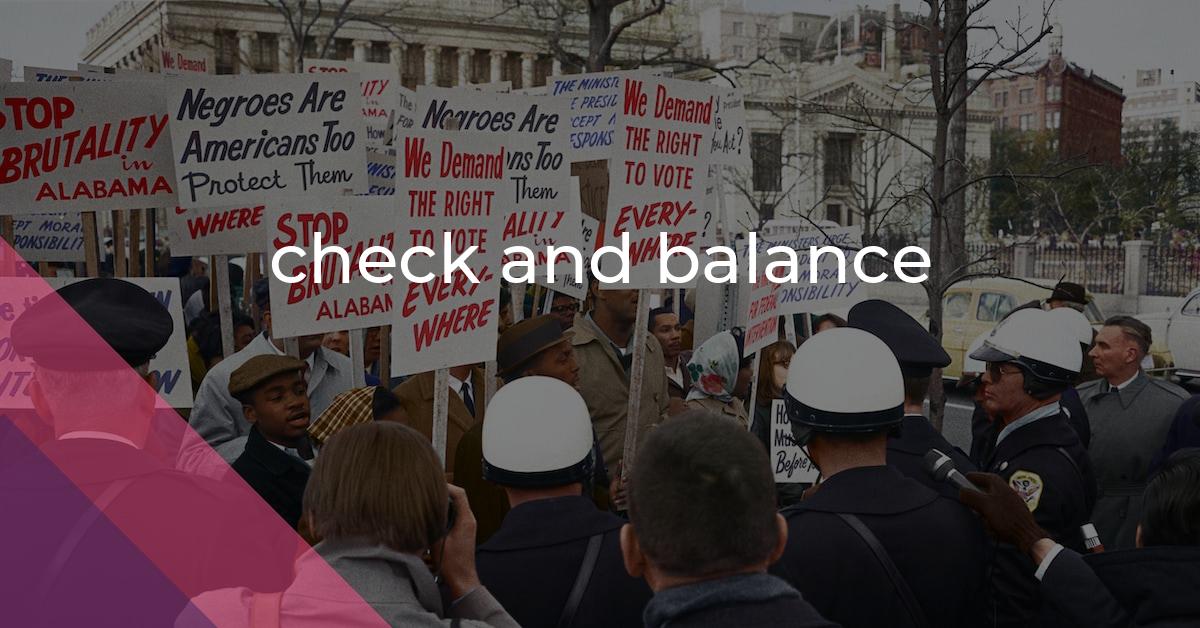check and balance: Idiom Meaning and Origin
What does ‘check and balance’ mean?
The idiom "check and balance" refers to a system or process in which various powers or influences are used to maintain fairness and prevent abuse of power.

Idiom Explorer
The idiom "keep the peace" means to maintain harmony, calm, and order in a situation or relationship, usually by preventing conflict or resolving disputes.
The idiom "juggling act" refers to the skill or challenge of managing multiple tasks or responsibilities simultaneously. It implies a delicate balance and careful coordination.
The idiom "judge, jury, and executioner" refers to a person who takes on multiple roles in a situation, unilaterally making decisions and carrying out their own form of justice without any oversight or input from others.
The idiom "in the interest of justice" means to take action or make a decision based on what is fair and right, rather than personal gain or bias.
The idiom "hold the reins" means to have control or be in charge of a situation or group of people.
The idiom "hold the cards" means to have the control or power in a situation.
The idiom "hold sway" means to have control, power, or influence over something or someone. It suggests a dominant authority that exerts its influence and maintains its position.
The idiom "happy medium" refers to finding a balance or compromise between two extremes or conflicting ideas.
The idiom "hang in the balance" means to be in a state of uncertainty or indecision, where the outcome is yet to be determined.
The Delicate Harmony
The idiom "check and balance" is closely related to the idioms "balance out" and "balancing act." These idioms further highlight the importance of maintaining equilibrium and avoiding excessive dominance in various aspects of life.
"Balance out" is a phrase commonly used to describe the process of restoring or achieving equilibrium or stability. It suggests the need to even out opposing forces or factors in order to maintain a harmonious state. This idiom is often used when discussing situations where one party or factor threatens to overpower or overshadow others, and there is a need to restore balance.
In the context of check and balance, the idiom "balance out" serves as a reminder that the system of powers and regulations in place aims to prevent any one branch or entity from gaining excessive authority. It emphasizes the importance of continually monitoring and adjusting these powers to ensure a fair distribution and exercise of authority. By doing so, the system can maintain a state of equilibrium and prevent any one party from overpowering the others.
Similarly, the idiom "balancing act" emphasizes the delicate nature of maintaining equilibrium and managing competing interests. It refers to a situation where multiple factors need to be considered and balanced effectively to achieve a desired outcome. This idiom often conveys a sense of complexity and the need for careful navigation.
In the context of check and balance, the idiom "balancing act" highlights the challenges involved in maintaining an equitable distribution of power. It recognizes the need to strike a delicate balance between the branches of government, organizations, or individuals to ensure that no one entity becomes too dominant. Just as a performer walking a tightrope must carefully adjust their movements to maintain balance, those responsible for upholding check and balance must carefully navigate the delicate dynamics of power.
When considering the idiom "check and balance" in relation to these idioms, it becomes evident that achieving and maintaining equilibrium is a continuous and ongoing process. It requires active participation and vigilance to prevent any one party from gaining unchecked authority and to uphold the principles of accountability and oversight.
By understanding and embracing the concepts represented by these idioms, individuals can contribute to the cultivation of a healthy and sustainable balance of power. This balance ensures that no one party becomes too dominant and that the necessary limits and controls are in place to prevent abuse or concentration of power.
The idiom "check and balance" reflects the principles of checks and balances in politics and governance. Its usage has expanded to encompass a broader meaning beyond the constitutional context, referring to any system or situation where opposing forces or factors maintain equilibrium. The idioms "balance out" and "balancing act" further emphasize the need for equilibrium and careful consideration when managing power dynamics. Through an understanding and application of these concepts, it is possible to cultivate a society that embraces accountability, fairness, and the ongoing pursuit of balance.
Example usage
Examples:
- The government has a system of checks and balances in place to ensure that no one branch has too much power.
- Having a second accountant review the books is an example of a checks and balances system to prevent fraud.
- The company's board of directors serves as a check and balance to the CEO's decision-making authority.
More "Government" idioms



